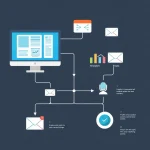Internet Marketing for Online Business
Your No Fluff Guide to Internet Profit Success

So you want to crack the code on internet marketing for an online business and (secretly) make this “Internet Profit Success” thing real? Good. You’re in the right place. Let’s roll up our sleeves.
How Do I Do It?

As with building all businesses, it takes time and money although a lot less money is needed to build an online business. The more money you have to put into your business the quicker it can grow and the less time you will need to apply to your business, but if you have restricted funds then you are going to have to put a lot more time into building your business.
You need to start with a good business plan. Many businesses fall at the first hurdle because their owners rush into building up a business with little or no business plans.
What is “Internet Marketing for Online Business”?
At its heart, internet marketing is just using the web to promote and sell products or services. Break it down:
Internet: the global electronic communication network connecting computers and systems.
Marketing: the process of promoting, distributing, and selling something.
So when you hear “internet marketing for online business,” think: using websites, email, social media, content, ads, everything digital, to grow your venture.
If you’re new, this might sound overwhelming. But it doesn’t have to be. Let me break it down further, then show you why it works, how you do it, what pitfalls to watch, and how to make it sustainable. And yes, we’ll keep “Internet Profit Success” in play.
Why bother with internet marketing?
You might be wondering, why not just open a regular shop or offer services locally? Here are the major advantages of internet marketing for online business:
1. Low startup costs
You don’t need a shop lease, interior design, lots of staff, physical inventory (necessarily). That makes the barrier to entry far lower.

2. Flexibility & control
You choose your hours, your audience, your scale. You can build it part-time while you hold down a job.
3. Global reach
Your potential market isn’t limited by ZIP codes or local foot traffic. Your product or message can travel worldwide.
4. Scalability
Once systems are in place (funnels, email campaigns, content hubs), your business can grow without a linear increase in hours.
5. Data & tracking
Every click, open, sale can be measured, so you know what’s working and what’s bleeding money.
Because of those reasons, people choose to be internet marketers even if they already have offline gigs. They experiment, build experience, then scale. If that sounds appealing, you’re in good company.
The Big Picture. What You’ll Need to Learn
Internet marketing is broad. Here are the core areas any aspiring marketer must grasp:
Traffic generation, getting visitors (via SEO, ads, social media, referrals)
List building / email marketing, converting visitors into subscribers you can communicate with
Content & copywriting, creating persuasive, helpful content (blog posts, emails, sales pages)
Offer creation & funnels, structuring how you present and sell your product/service
Conversion optimization, tweaking pages, offers, flows so more visitors become customers
Analytics & iteration, measuring performance, improving over time
If you neglect any of these pillars, your “internet marketing for online business” plan will leak.
Don’t fall for get‑rich‑quick hype
Before we go deeper, here’s a warning: the internet is full of scams and overpromise. You’ll see ads that promise “make $5,000 a day doing nothing.” Almost all are bogus.
If it sounds too easy, it probably is. Real success in internet marketing for online business demands:
Time
Patience
Testing & tweaking
Sometimes outsourcing
Grit
Expect at least six months before you see consistent traction, and more likely a year before you replace a full-time income (if you’re smart and persistent). Yes, you might accelerate if you hire help, but you’ll still need oversight.
How to actually do internet marketing for an online business
Ready to get tactical? Here’s a roadmap, step by step.
1. Pick a niche & validate demand
Don’t try to be everything to everyone. Pick a focused market (e.g. “vegan skincare for men,” “digital productivity tools for writers,” “online coaching for new parents”). Validate that people are searching for something in that niche (using keyword tools, forums, social media). Use your related phrase “how to start internet marketing business” logic here: newbies often search “how to start + niche.”
2. Create a business plan & content architecture
Yes, even for an online business, a plan helps. Map out:
Your audience & their pain points
The content and offers you’ll build
Channels you’ll use (SEO, social, email, ads)
Revenue model(s) (digital product, affiliate, service, membership)
Then sketch a content architecture: blog topics, email sequences, lead magnets, offers. This blueprint helps you stay consistent.
3. Set up your online platform (website + systems)
You don’t need ultra fancy. A clean, well-organized site with:
A homepage
Blog or resource area
Opt‑in / lead magnet pages
Sales pages
Email integration
Pick a dependable platform (WordPress, Webflow, Squarespace, etc.). Use an email service (ConvertKit, MailerLite, etc.) from day one.
4. Drive traffic: free & paid

You’ll combine multiple channels to drive traffic:
SEO / content marketing: write blog posts answering questions people search for (use your main keyword “internet marketing for online business” in strategic places, but naturally).
Social / community: show up in places your audience hangs out (Reddit, Facebook groups, LinkedIn, Instagram, etc.). Don’t sell, be helpful.
Email marketing: your list is gold. Use lead magnets (cheatsheets, ebooks, mini‑courses) to grow it.
Paid ads: once you have a proven funnel, invest in ads (Google Ads, Facebook/Instagram ads). Be careful with budgets.
Each channel feeds the rest. For instance, content drives organic traffic, some of whom subscribe via email, then you promote an offer to the list, use ad retargeting, etc.
5. Build & nurture your list
Imagine someone visited your blog. How do you stay connected so they don’t vanish? You need to:
Offer a lead magnet (useful free resource)
Request opt-in (email)
Send welcome series (3‑7 emails)
Then regular value + occasional promotions
This is key to Internet Profit Success: you're not relying on one-time visitors, you’re building a relationship.
6. Create offers & funnels
Not every list subscriber buys immediately. So:
Offer low-risk, low-cost entry products (tripwires)
Deliver value, then upsell them
Use sales pages, email sequences, webinars or video funnels
Use scarcity, bonuses, guarantees to reduce friction
Think of the funnel as your “sales process in code.”
7. Test, measure, iterate
This is where you grow. Use analytics (Google Analytics, email metrics, ad dashboards) to see:
Which content leads to subscribers
Which emails convert
Where people drop off in funnels
Double down on what works. Discard what doesn’t.
8. Scale & outsource
Once your funnel is proven, you can outsource parts:
Content writing
Ad management
Design
Funnel setup
This frees you to focus on bigger strategy, relationships, growth.
Does internet marketing really work?
Short answer: yes, but only if done well. The proof is everywhere. Million-dollar blogs, thriving niche sites, high-earning coaches, affiliate marketers, they all exist.
That said, not every site makes money. Many fail. But the ones that succeed often share traits:
Value-first approach
Consistency
Data-driven tweaks
Community & trust
So, when you practice internet marketing for online business, you’re aligning with a system that already works (for many). Your job is to join the club, but you have to deliver value, not hype.
How long does success take?
“How long is a piece of string?” is a fair question. There’s no one-size answer, but here's a rough guide:
First 3 months: content, site setup, initial traffic tests, list building
6 months: you might see small conversions, one or two sales
12 months: if persistent, you could be making a modest full‑time income
18–24 months: with refinement, you might reach stable and scalable earnings
If you have cash, you can speed things up via outsourcing and paid traffic. If you’re bootstrapping, expect slower growth but stronger fundamentals. Just don’t buy into “earn 5k in 30 days with zero work” scams.
Common mistakes & how to avoid them
Let me save you some pain by listing mistakes I’ve seen newbies make:
No niche / too broad
Trying to sell everything to everyone = failure to resonate.
No plan / random posting
Without structure, you’ll drift and waste time.

Overemphasis on tools, underemphasis on content
Fancy funnels won’t save you if your message sucks.
Ignoring analytics
If you don’t track metrics, you can’t improve.
Not nurturing the list
Neglecting subscribers = no long-term business.
Jumping too fast into paid ads
Without a tested funnel, ad spend is throwing money away.
Expecting overnight riches
The hype traps many.
If you dodge those traps, your route to Internet Profit Success gets smoother.
Sample content expansion & examples
Let me add a couple of illustrative stories or examples to give this depth.
Example: Niche site + affiliate income
Jane loves yoga and starts a blog about “yoga for desk workers.” She writes content around problems desk-based people face (stiffness, back pain). She signs up for an affiliate program for yoga props (mats, blocks). She builds an email list with a free “5-minute desk yoga video.” Over months, she promotes affiliate offers and later introduces her own digital mini-course. That’s internet marketing for online business in action.
Example: Coaching / service-based
Carlos is a graphic designer. He starts by writing blog posts about “how to design a business card” and “branding tips for startups.” He offers a free checklist (lead magnet). He grows a list, publishes case studies, then offers his design packages. He uses email sequences and small paid social ads to retarget interested leads. Over time, his online presence becomes his biggest client generator.
In both cases, the model is the same, content → list → offer → scale.
Your launch checklist
Here’s a practical mini‑checklist to get you started:
Pick a niche & validate demand
Build a simple website + email system
Write 5 cornerstone blog posts around your niche
Create a lead magnet + opt‑in page
Promote those posts (social, share, guest posts)
Send welcome sequence emails
Create a low-cost offer or affiliate offer
Build a basic funnel
Measure & test
Refine, outsource, scale
At each step keep your goal in mind: Internet Profit Success.
Final thoughts & encouragement

If you have the time, patience, and willingness to learn, going into an internet marketing for online business path is one of the best bets out there. Yes, there’s noise and hype. But beneath that, there’s a real path for people who deliver value and stay consistent.
You get to choose how big to go, which niche to serve, and how fast to scale.
You don’t need a huge budget, though money helps. Most importantly, you need persistence.
I have 5 Free Videos to help you on your way
